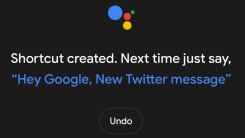What's Coming to Netflix the Week of August 30, 2020
Would you leave your family for three years to go on a mission to Mars? Normally that would be an easy no, but I haven’t been alone since March 11, so

Google’s first smart speaker, the Google Home, debuted in 2016, and it’s taken four years for Google to add a single feature in its digital assistant that I would consider essential for anyone looking to control their smart home—specifically, their lights.
While it’s true that you can tell your Google Assistant to turn your lights on and off immediately, once you’ve connected said digital helper to whatever service it is you use for your lighting, that’s about as complex as you’ve ever been able to get. Well, unless you count the slightly more nuanced “sleep my” or “wake my” commands, which let you schedule your lights to dim or brighten up to 24 hours in advance.
But you couldn’t tell Google to turn your lights on or off at a specific time—at least, not until now. Fading them on and off added an annoying and unnecessary delay, but now—assuming your Google speakers or smartphone apps have whatever latest update enables the feature—you can tell your speaker to turn your lights on and off at set times.

The times don’t have to be exact. If you want your lights off at 8 p.m. that day, telling Google Assistant to turn them at that time works just as well as telling Google Assistant that you want your lights off in five minutes. You can also have your Google Assistant only turn the lights on for a certain amount of time—say, ten minutes. Or, if you still like the ability to fade your lights in and out, you can give Google a fade time: “Brighten my lights for 30 minutes,” for example. (You can’t fade your lights less than five minutes.)
Similarly, Google Assistant can also turn lights on and off at sunset and sunrise with voice commands, and you can schedule all these new smart home actions up to seven days in advance. Google Assistant should be able to cancel scheduled actions, too: tell it to either “cancel my schedule actions” en masse, or ask it to “remove my [device name]’s schedule.”
I say “should be,” though, as reports indicate the cancelling process doesn’t quite work yet. Also, while you would think that it would be easy to replicate this process for devices that aren’t lights, such as a smart plug, that doesn’t appear to be working yet, either.
Despite these quirks, Google’s implementation is ideal. Finally, I can tell my bathroom lights to turn on and off for the time I’ll likely be in there, rather than having to fuss with awkward dimming or mashing a physical button—which I always remember to turn on, but sometimes forget to turn off.
[Android Police]

Would you leave your family for three years to go on a mission to Mars? Normally that would be an easy no, but I haven’t been alone since March 11, so

How do you manage a multi-platform household? Not everyone is completely loyal to Apple, Google, Microsoft, or any other tech company. You might own a

Apple has released watchOS 7.3, which you’ll need to install if you want to play around with its brand-new “Unity” watch face that the company release

Kerboom. That’s the sound of your Telegram account automatically deleting itself. Honestly, I wish this feature was baked into more services. Wouldn’t

As Twitter rolls out its new Twitter Blue subscription service, some of us still long for the olden days when the timeline was nothing more than a bun

Internet users increasingly want a more anonymous browsing experience, which has a major impact on advertising, eCommerce, and the online economy as a

The shift was already happening, but after a year and a half of remote work during the pandemic, Slack has become the de facto business messaging app.

“Your system has run out of application memory” is not a warm, friendly alert. It feels cold and dark, as if your Mac is telling you “the end is nigh.
We are a comprehensive and trusted information platform dedicated to delivering high-quality content across a wide range of topics, including society, technology, business, health, culture, and entertainment.
From breaking news to in-depth reports, we adhere to the principles of accuracy and diverse perspectives, helping readers find clarity and reliability in today’s fast-paced information landscape.
Our goal is to be a dependable source of knowledge for every reader—making information not only accessible but truly trustworthy. Looking ahead, we will continue to enhance our content and services, connecting the world and delivering value.